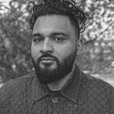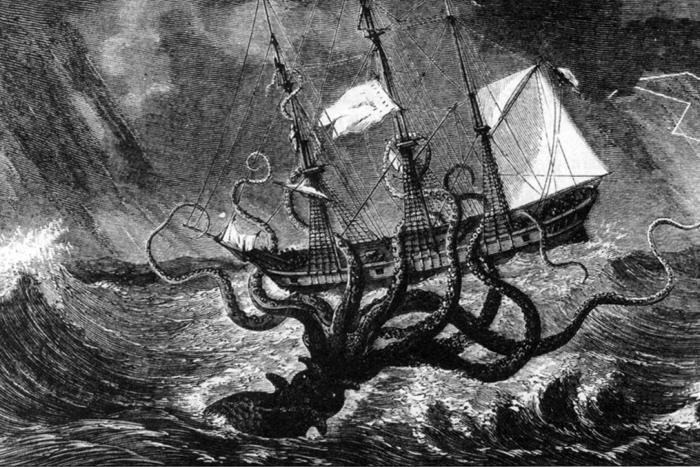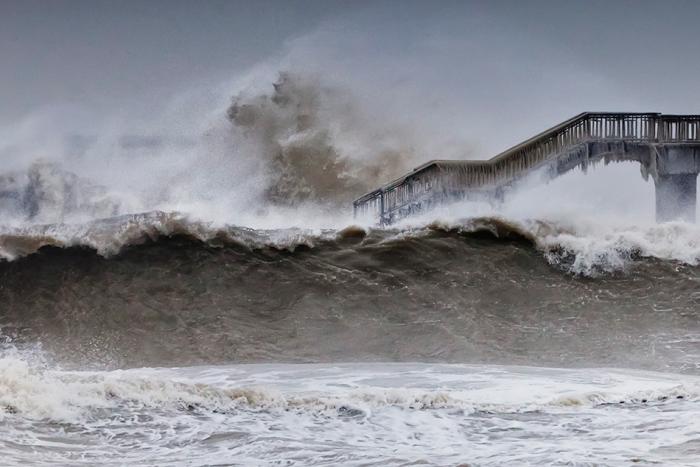I message my pal Allison on my way out the door, i hope i don’t get SHOT, and realize how scared I am. I didn’t hear about the shootings in a Quebec City mosque until that morning. Immediately I thought of my mother in Toronto’s east end, retired, and who would spend most of the day alone; I felt a strong pull towards her. I head to my parents' house with a book to read, a nugget of weed, and my laptop. I don’t know how long I plan to stay over but I know that I need to be close to my parents right now. Fear uncoils in me slowly; I’m 29 and feel both like an adult—I want to protect them—and like a child—I need their protection. I don’t know from what—the shooting, on top of our American neighbours' Muslim Ban, has uncorked numerous terrific possibilities in my anxious brain.
The shooting is part of Canada and the West’s descent into Islamophobia. Canada, long thought of as a diverse and safe multicultural playground, has steadily ostracized its Muslim citizens: Stephen Harper’s overcooked rhetoric around banning the niqab, Bill C-51, the “barbaric cultural practices” hotline. The problem is not only Canada’s, but West-wide: the alleged shooter in the Quebec City massacre, Alexandre Bissonnette, was influenced not only by Quebec’s entrenched Islamophobia but by President Donald Trump and Marine Le Pen, the leader of France’s far right National Front. Right-wing nationalist ideology is showing no respect for boundaries. Instead of being united by progressive ideals, the West is bound together by a regressive, angry, backlash towards immigrants. Muslims and other minorities had always known this; now the veil was being lifted for everyone.
My mother is light skinned and doesn’t wear any obvious Islamic identifiers, but I’m terrified. I’m worried about Josh and Rutchit, Catholic Goan and Hindu Punjabi friends, for what they might get mistaken as. I’m worried for the Black Muslim girl on the subway with headphones in, for the South Asian Muslim man with bags of groceries by his feet. I’m worried for my headstrong father, who might not know when to back down, for a queer Muslim friend who is an Afghan refugee, for all my friends who have to stay strong in the face of this and might not know how to ask for help. I’m worried for writers who are tweeting endlessly and providing information, hope, resources, and community. My fear is large and overwhelming—I’m afraid for the lives of others around me—and it is small and petty; I was really looking forward to finally listening to Jeffrey, Young Thug’s latest album, but I am too scared to put on my headphones on the subway for fear of those around me. I am tense on the ride east, my eyes searching the car for anyone who looks like they might pop off with a racial slur, or take a swing at someone. I know that, after these kinds of shootings, those with these desires become emboldened and feel like they have been given permission to let loose these destructive desires.
Strength in the face of this kind of relentless fear is its own terror. It’s hard to be vulnerable when you are a target; it is hard to show weakness when it is consistently being exploited. This means it’s impossible to be human. The day-to-day fear that has existed for Muslim immigrants since 9/11 has operated like waves against the shore, eroding our sense of self, stripping us of our possibilities and crippling our engagement with the world. I feel like I always have to be strong to repay the sacrifice my mother and father made by coming here, especially against the demonizing rhetoric sprouting from our political leaders. I don’t want my parents to feel like it was a waste, or that they made the wrong decision. I want to pretend to feel safe, even if that means disregarding a type of softness that allows for humanity.
*
My whole life in the west I have felt Othered, like a ghost trapped outside the house it’s meant to haunt, but I was told my fears were irrational: Canada is diverse and safe. We were told assimilation was the route. We would trade our labour and our minds for protection. It didn’t matter if I was called a Paki, it didn’t matter if we were passed over for jobs, it didn’t matter that white people were scared of our ghettos and the hubs where we congregated because we didn’t know where else we were allowed: we were safe and the opportunities were endless.
My earliest recollections are of the ‘92-‘93 Bombay riots in which Muslims were killed en masse; these early throbs of memory, of one of the world’s largest and most beautiful cities under lockdown, my parents fearful for our safety, has coloured my whole perception of the world and our migration to the West. We were visiting India from where we lived, Saudi Arabia, to decide whether we would move back to India, or to the West. The riots were the deciding factor—it wasn’t safe for my brother and me to grow up in India. My mother’s heart broke a little, but the decision was made that it would be better for us in Canada. How would my parents revisit the texture of this decision now, knowing how hostile the West has become for Brown people? Surely, they would still fly out west, but would there be hesitation? Would they have raised us differently: to be quiet, to be passive, to learn to expect less? My parents grew up in a tumultuous India and they know the way daily fear eradicates the inner self. Would they have passed on more of those lessons? More than anything, our parents want us to be safe, and to have opportunity, that was the impulse behind leaving our lives.
We escaped. We are grateful. We are tidy, neat, assimilated immigrants—we started in Graydon Hall, North York, one of Toronto’s immigrant suburbs, and moved to the east end, to Leslieville, full of young moms and yuppies, where my parents might be the only Indians on their block. Why are we still scared?
*
I have no plans. I don’t even talk to my mother about the Quebec shootings. I pet their cat and she tells me that the Quran my father ordered me from Amazon has arrived. It’s a new version, called the Study Quran, and is meant to operate as a progressive, modern translation. We are good, and secular, and do not practice anything “barbaric.” I search around the house for my rehal, on which you are meant to place your Quran to read. We are secular Muslims in a way that confuses many people and in a way that people still don’t think is even possible. When my father comes home from work he instantly asks me if something is wrong and I say no, nothing, that I felt like being around family. I think they interpret awful news differently because they are used to seeing so much more of it than I am. They know you have to keep working, keep moving forward, protecting what’s yours. We try to be good immigrants—even if that narrative is fractured, it is something to hold on to. Even if the goodness we saw in the West is not refracted back on us, we believe in that initial impulse to migrate, that you come here, work hard, and the rest will follow.
My phone lights up sporadically as texts roll in from friends asking me how I am. Muslim and non-Muslim friends alike are texting, wondering how we’re navigating these new developments. My mother packs some food for a Muslim friend of mine who lives nearby whom she has never met. Already, I am tired of my Twitter feed and the constant thrum of bad news. Fear sprouts anger: I clench my jaw every time a well meaning white acquaintance posts a generic status update on Facebook offering to “take care” or “help” their Muslim friends by conducting some meaningless task. Of course, it could be helpful, but I am enraged by anything that doesn’t immediately solve the problem, that seeks to make anyone comfortable instead of safe. I am exhausted.
*
The week moves on. On Monday and Saturday mornings there are two protests against Islamophobia, but again, truthfully, I am scared: what an excellent place to get shot! I keep reminding myself that I am not supposed to be frightened, that I have to play my role in the ummah, as a citizen, but the exhaustion is primal. Trump is already moving on to other executive decisions, a lone man swings a knife at the Louvre screaming, apparently, “Allahu Akhbar,” Trudeau backtracks on his promise for electoral reform, and by Friday, the Toronto Sun runs a front page headline, “Terror At Our Door: Hundreds of Spies, Radicals Tried to Enter Canada in 2016.”
Fear has become an everyday presence, something rooted so deep into my being that calling it anything but terror seems shameful. For years now, when someone has asked me what religion I am, I feel my throat clench up, but I always say Muslim. I’ve been scared for a long time of exploring my religion, scared of Googling certain innocuous things, worried about expressing any sort of solidarity too loudly. My whole adult life I have been taught that something is wrong with my history, my culture, and the essence of my character. The Quebec City mosque that was attacked last week had been targeted before—last year, during Ramadan, a pig’s head was left on their doorstep. No one was ever arrested. The message is overwhelmingly clear: we are not welcome. Yet, we are here, everywhere, invisible in big cities and small, until someone cuts us down.
How not then, for Muslims to feel what the West dreads the most—anger. Barracked to the fringe of society, expected to give our labour without anything back, and then hated for our supposed inability to fit in, there is nowhere to turn. Fear calcifies, leaving us in the same spot; at least anger propels. Muslim rage has become the Grim Reaper of the West, whose scythe is strong enough, apparently, to cut through hundreds of years of Western culture. We deranged barbarians who fuck goats and beat their wives are sly and smart enough to overcome Western might with shoe bombs and Sharia law. The narrative of Muslim rage suggests it is an eventuality of a tribal ideology bucking up against Western superiority and that it is a war with only one winner.
Despite Richard Spencer and his white supremacist cronies’ wish for a “peaceful ethnic cleansing,” they ignore that the West already belongs to immigrants and that our labour and culture has built it. This can’t be undone. There is no history of the West, as it is currently configured, without immigrants. As long as fear is the primary tool in the white West’s enagement with its Muslims, there will be an insurmountable gap between Us and Them.
I leave my parents' house the next afternoon. My father has driven to his job in Etobicoke, my mother will remain home, south of Greektown, and I will try get some work done in the west end, squashed in Koreatown. The fear that was trembling so eagerly yesterday has lifted slightly, and although I still don’t feel comfortable enough to slip my headphones into my ears, I relax a little more on the subway. Everything will slowly slide back to normal and even if that means a kind of invisibility, I have to be okay with it, because with that also comes a kind of safety. For now, when I think about my family and friends, all trying to carve out a space for themselves here, that is enough.






